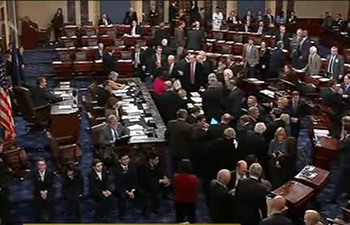WASHINGTON, Feb.12 (Xinhua) -- The White House on Monday submitted to Congress its budget plan for the fiscal year 2019, shifting resources from domestic programs to national defence and leading to a mushrooming deficit.
Titled Efficient, Effective and Accountable, the budget plan amounts to 4.4 trillion U.S. dollars, a 10 percent increase compared to the U.S. government spending in 2017.
The plan aims to cut down investments to welfare programs like Medicare and food stamps, as well as expenses of certain federal agencies, but proposes to increase the spending on defense, a top priority for Trump.
"The budget reflects our commitment to the safety, prosperity, and security of the American people. The more room our economy has to grow, and the more American companies are freed from constricting over-regulation, the stronger and safer we become as a nation," Trump said in a message released by the House.
However, according to the U.S. media, the plan would add 984 billion dollars to the federal deficit next year, contrary to Trump's promise of a balanced fiscal house.
The White House has said the lost revenue due to tax cuts would be made up for by the booming economy, an assumption that is falling short of expectation.
The budget has attracted frowning faces in Congress, as lawmakers across the aisle expressed their dismay at the ballooning debt and steep cuts in welfare programs.
"The Trump budget proposal makes clear his desire to enact massive cuts to health care, anti-poverty programs, and investments in economic growth to blunt the deficit-exploding impact of his tax cuts for millionaires and corporations," said Democratic Representative John Yarmuth.
The top Democrat on the House Budget Committee also said the cuts to critical federal investments are so extreme that they can only reflect a disdain for working families and a total lack of vision for a stronger society.
The U.S. federal budget is proposed by the executive branch and approved by Congress, but a split Congress has resulted in an inability to pass annual budgets on time, causing repeated government shutdowns in past weeks.
Adding to U.S. financial woes, increasing expenditure together with stagnant revenue has created hundreds of billions of dollars in deficit each year, burdening the U.S. economy with heavy debt.













